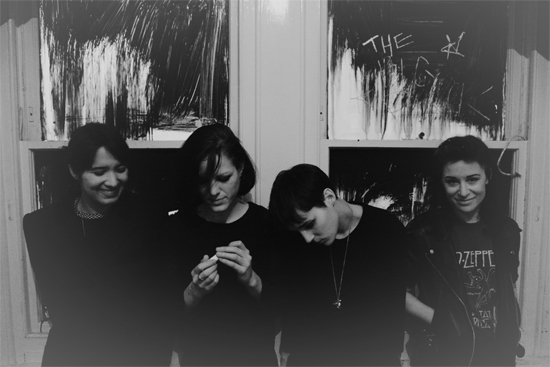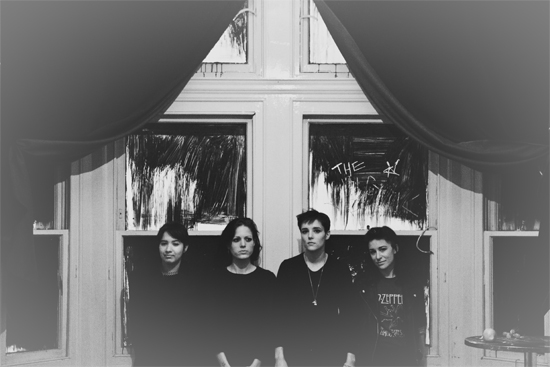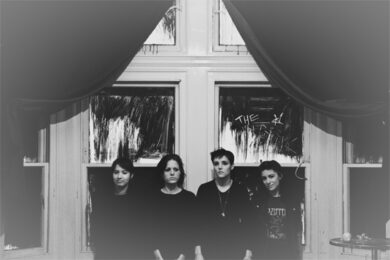In fifteen years of writing about music there have only been a handful of times that witnessing a group in the very earliest moments of their existence has been a notable experience. One of those was seeing what was, I think, British Sea Power’s second London gig in 2001, when in front of myself and a crowd of five, they played a set of pole-axed and deranged, entirely transportative rock music.
By a neat coincidence, one of the others occurred when London four-piece Savages played their debut concert supporting BSP at their inaugural Klub Krankenhaus in early January. Despite the fact that they’d only received the call that morning, it was an inspired, assertive performance. A mixture of guitars that blurred from abrasive noise into the chiming gothic, a rhythm section that did a hulking dubbed-out thing with excellent bass and the tom-heavy drumming that so many women in no-wave/punk bands do so well, on top sat an incredibly powerful voice, bright through layers of reverb like a streetlamp through rain.
In that half an hour, Savages displayed more aggression, desire and determination than pretty much every guitar group you’re likely to see in 2012. It was doubly satisfying that this was no one-off. A second performance weeks later at London’s Shacklewell Arms (see video below) was even more impressive. In interview shortly before that performance, Savages (who comprise vocalist Jehnny Beth, guitarist Gemma Thompson, bassist Ayse Hassan, drummer Fay Milton) are just as clear in their vision for the group. Like our other favourite new guitar-based band Toy, Savages have been through the industry mill and are determined to do things on their own terms.
Jehnny Beth: It started as a project that Gemma had been talking to me about for a year, because we play together in John & Jehn. I was desperate for her to ask me to play in her band, but it took me six months to dare to ask. She was coming to my house, telling me about this band she wanted to start, and how she was looking for people… When I asked her [if I could join], it took her two days to get back to me.
Gemma Thompson: I didn’t answer. It was kind of a deliberate ploy, I thought ‘I’m going to make her think about this’.
JB: I think we all believe that to start a band is something very serious. We all know what it demands, so to ask and say yes and to get people involved is something you have to really consider.
GT: The two of us had been together for a while. We didn’t think we’d have an all girl band initially – it’s a weird one, it all just came about. It became the three of us with Ayse, then we felt we had to have a female drummer as well. Because it is like a gang, everything each person does is equally important, so all their individualities have to be four girls.

Your first gig felt like it was people who had been working hard, who had something very powerful going on. The intent was very much there. Did you have discussions about what you wanted it to be?
JB: Of course. We said we wanted to play loud. I think we had that discussion a thousand times.
GT: The final piece of the puzzle was the Brighton gig, playing those songs live at full volume. We heard things for the first time on that night.
What loud inspirations do you have?
JB: The people we were talking about were Queens of the Stone Age, Gun Club, that kind of up-and-down rollercoaster music.
It’s exciting that you can’t quite place all the different elements. There was initially just the one Savages track on your Facebook page that’s just noise, and no indication of what you sound like. Was it a deliberate red herring?
GT: That was intentional.
JB: Just Gemma’s noise. The sound of her brain.
Are you into more abstract, avant-garde music?
GT: Einsturzende Neubauten, things like that. Blixa Bargeld’s guitar for me… New York no-wave, classically trained musicians who take things apart, all of that has gone through. There’s the idea of taking it apart, the same with artwork and music. We want to get our ideas across with as few marks or as few notes as possible.
JB: We try to simplify things. With lyrics, I try to write a lot and then go ‘no, no’, I take as much out as I can. I think that’s the same with everything: keep that, and repeat it. These girls, they have an idea every second.
FM: We went through a phase of removing the choruses from each song, and they all seemed to get better because we did that.
The rhythm section is very minimal.
FM: My background is more from dance music, UK garage, which is really different from these guys, and more recently Can, Silver Apples and more groove-based stuff.
AH: We wanted to have a really solid rhythm section to get people listening.
FM: And to get people dancing. Dancing is beautiful.
JB: The idea was to have solid bass and drums so me and Gemma can fly above, and be ourselves.
Lyrically, you say you have a lot of ideas and then reduce it down. What inspires you, or what have you been trying to convey?
JB: When I started Savages I said ‘I’m not going to write any love songs’. I wanted to write about war, or strange people. Then the frustration of love, or when there’s no possibility of love between two people. But then I stopped being too radical with that. When I sang the song ‘Hit Me’ for the first time, I felt really conscious of it. I was saying the other day that the first time I try my lyrics with the music I feel really shy. When I write it’s fine, but when I have to sing it, it’s on another level. ‘Hit Me’ is about how desire can come from very awkward places. There shouldn’t be any moral prejudice about that. That’s what ‘Hit Me’ is about, the love of blows.
Masochism maybe?
JB: If you want to think that then that’s fine. Maybe if you turn it to sexual.
You can have emotional masochism.
JB: Yes… The fact that we’re an all-girls band is really cool for me, because I can talk about a lot of shit that, because we’re four girls, it makes a huge difference for me in a way, I don’t know why. I think it frees me so I can talk about violent things, it makes artistic distance and a tension.
Does it become more provocative?
JB: There’s an edge to it, yes. If we were four girls and I was singing about flowers, then it would be on the same level. If you were four boys with big beards and muscles singing about war, that wouldn’t be weird. But because we’re four girls there’s loads I can play with like that.
It’s that thing, though, that people would make a big deal about you being an all-girl group. I didn’t want to mention that you were an all female band unless you brought it up. It doesn’t need to be said.
JB: I am really excited about it though, and maybe that’s why I brought it up. I really like girls, to be part of that it feels special.
Perhaps there’s something to be said for it because at the moment a lot of groups that are all female, or female fronted, there’s a real twee thing. Female musicians are put into a kooky box…
FM: Floral… I hate cupcakes. I’m not a big fan of that twee thing. None of us are really girly girls, but none of us are non-girly girls.
JB: I feel really sexy.
FM: I’m probably the girliest and I’m at the back, smashing the drums, putting lipgloss on.
JB: Looking at boys.
FM: I really like that clash of what you expect…
GT: The thing I really liked at the Brighton gig was after we’d played and you came off the drum kit wearing a long black dress, and you had to hold it up to get over the drum riser.
JB: Like the Queen.
JB: I like when men play with identity as well. I think we have both sides.
Again though, there are precious few men doing that at the moment
FM: Hairy!
Yes, music is very hairy at the moment. There are very few groups playing with gender or even discussing it. Music is either hyper-bloke or anti-bloke in a sat-in-the-bedroom, playing-on-the-computer way…
JB: Geeky! I think it’s a personal thing as well. It’s not just doing it for that band. I think we’re all curious.
FM: I think that’s just what comes out.
JB: When I say I am proud to play with girls I think it’s also because girls have this potential of being very adventurous, much more so than men. You don’t have to push too much, it’s really interesting to make exciting things.
And this includes how you’re going to release your music? You have the Pop Noire label. Do you want to keep things in the family, as it were?
JB: Pop Noire is a label I created with my partner John [from John & Jehn] after one year of intensive lawyer fight with our previous record company. It was very much in reaction to that story and to many friends’ experience with the industry, that we thought bands should start working together rather than solely with their manager. It is an artist-driven label with a lot of resources that aims to provide a strong artistic vision and great music. We’re kind of a family really, made of film makers, musicians, producers…
FM: There is safety in numbers.
GT: You have to get off your arse and work for it.
Savages can be found on Facebook here. Savages play the Queen Of Hoxton on February 23rd




